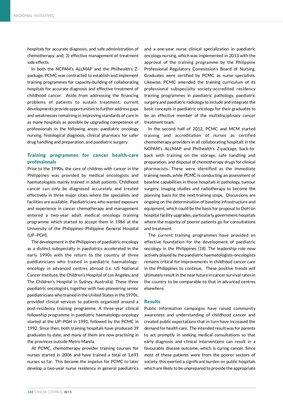
hospitals for accurate diagnosis, and safe administration of
chemotherapy, and; 3) effective management of treatment
side effects.
In both the NCPAM's ALLMAP and the Philhealth's Zpackage,
PCMC was contracted to establish and implement
training programmes for capacity-building of collaborating
hospitals for accurate diagnosis and effective treatment of
childhood cancer. Aside from addressing the financing
problems of patients to sustain treatment, current
developments provide opportunities to further address gaps
and weaknesses remaining in improving standards of care in
as many hospitals as possible by upgrading competence of
professionals in the following areas: paediatric oncology
nursing, histological diagnosis, clinical pharmacy for safer
drug handling and preparation, and paediatric surgery.
Training programmes for cancer health-care
professionals
Prior to the 1990s, the care of children with cancer in the
Philippines was provided by medical oncologists and
haematologists mainly trained in adult patients. Childhood
cancer can only be diagnosed accurately and treated
effectively in three major cities where the specialists and
facilities are available. Paediatricians who wanted exposure
and experience in cancer chemotherapy and management
entered a two-year adult medical oncology training
programme which started to accept them in 1986 at the
University of the Philippines-Philippine General Hospital
(UP-PGH).
The development in the Philippines of paediatric oncology
as a distinct subspecialty in paediatrics accelerated in the
early 1990s with the return to the country of three
paediatricians who trained in paediatric haematologyoncology
in advanced centres abroad (i.e. US National
Cancer Institute, the Children's Hospital of Los Angeles, and
The Children's Hospital in Sydney, Australia). These three
paediatric oncologists, together with two pioneering senior
paediatricians who trained in the United States in the 1970s,
provided clinical services to patients organized around a
post-residency training programme. A three-year clinical
fellowship programme in paediatric haematology-oncology
started at the UP-PGH in 1991, followed by the PCMC in
1992. Since then, both training hospitals have produced 39
graduates to date, and many of them are now practising in
the provinces outside Metro Manila.
At PCMC, chemotherapy provider training courses for
nurses started in 2006 and have trained a total of 1,691
nurses so far. This became the impetus for PCMC to later
develop a two-year nurse residency in general paediatrics
and a one-year nurse clinical specialization in paediatric
oncology nursing, which was implemented in 2013 with the
approval of the training programme by the Philippine
Professional Regulatory Commission's Board of Nursing.
Graduates were certified by PCMC as nurse specialists.
Likewise, PCMC amended the training curriculum of its
professional subspecialty society-accredited residency
training programmes in paediatric pathology, paediatric
surgery and paediatric radiology to include and integrate the
basic concepts in paediatric oncology for their graduates to
be an effective member of the multidisciplinary cancer
treatment team.
In the second half of 2012, PCMC and MCM started
training and accreditation of nurses as certified
chemotherapy providers in all collaborating hospitals in the
NCPAM's ALLMAP and Philhealth's Z-package, back-toback
with training on the storage, safe handling and
preparation, and disposal of chemotherapy drugs for clinical
pharmacists. These were identified as the immediate
training needs, while PCMC is conducting an assessment of
baseline capabilities in those hospitals in pathology, tumour
surgery, imaging studies and radiotherapy to become the
planning basis for the next training steps. Discussions are
ongoing on the determination of baseline infrastructure and
equipment, which could be the basis for proposal to DoH on
hospital facility upgrades, particularly government hospitals
where the majority of poorer patients go for consultations
and treatment.
The current training programmes have provided an
effective foundation for the development of paediatric
oncology in the Philippines (18). The leadership role now
actively played by the paediatric haematologists-oncologists
remains critical for improvements in childhood cancer care
in the Philippines to continue. These positive trends will
ultimately result in the near future in cancer survival rates in
the country to be comparable to that in advanced centres
elsewhere.
Results
Public information campaigns have raised community
awareness and understanding of childhood cancer and
created public expectations that in turn have increased the
demand for health care. The intended result was for parents
to act promptly in seeking medical consultations so that
early diagnosis and clinical interventions can result in a
favourable disease outcome, which is curing cancer. Since
most of these patients were from the poorer sectors of
society, this exerted a significant burden on public hospitals
which are likely to be unprepared to provide the appropriate
REGIONAL INITIATIVES
142 CANCER CONTROL 2015